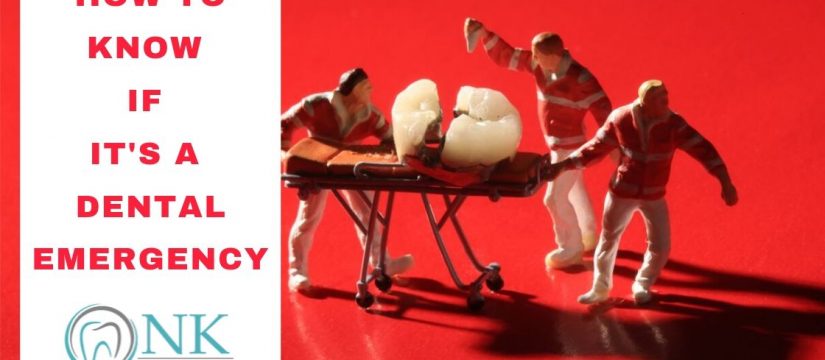
Unfortunately, good oral hygiene is not sufficient to keep the potential for dental emergencies at bay. Because everyone is susceptible to experiencing a dental emergency, it’s important to know your plan of action. Not all dental pain may necessitate an emergency visit, so here is a basic guide to help you determine when you should make that call to your dentist — either during office hours or after-hours.
What Is a Dental Emergency?
Dental emergencies vary in type, severity and treatment. According to Shawn Watson, writing for Verywell Health, they involve a high level of pain and impaired function to the teeth, mouth and/or jaw. In general, a situation is considered a dental emergency when a tooth has been lost due to injury (such as a sports-related injury) or is in immediate danger of being lost, as well as an abscess (infection around the tooth’s root or gum line).
Signs of a Dental Emergency
Because dental emergencies exist on a variable scale, it can be difficult to determine exactly what qualifies as a dental emergency. Very serious emergencies tend to apply to tooth fractures and infections. Conditions that are still urgent but may not be at the high level of severity as an emergency can include intermittent dull, low-level tooth pain and tooth sensitivity.
However, dental pain is one of the easiest-to-notice signs of a dental emergency. This pain can present as spontaneous, throbbing or even feel warm. It may spread to the cheek, temple or ear. Other dental pain may be severe and persistent — made worse by chewing or biting — and can lead to the development of an abscess. Left untreated, an abscessed tooth can turn into a serious, life-threatening condition.
Cracking, breaking, or suddenly losing a tooth due to injury can be considered dental emergencies. Should you lose a tooth because of injury, our January 23 blog post — “So You Lost a Tooth! How to Handle Accidental Tooth Loss” — provides instructions on what to do to improve the chance of the tooth being successfully re-implanted.
You should call your dentist for an emergency appointment if you have:
- A cracked tooth
- A broken tooth
- The sudden loss of a permanent tooth not caused by injury
When it comes to less severe matters like tooth sensitivity or minor discomfort, you should schedule a dental appointment as soon as possible. These signs may be indicators of loose fillings, minor tooth decay or a small amount of gum recession exposing parts of the tooth’s root surface.
Many types of dental emergencies can be prevented by wearing a properly fitting mouth-guard while participating in sports, not engaging in bad habits like chewing ice and — of course — scheduling twice-yearly dental exams and cleanings. Your dentist will be able to detect and treat early signs of decay or other conditions before they have the opportunity to develop.
Should You Go to the Hospital or the Dentist?
Some dental emergencies cross the line to a medical emergency that requires calling 911 or going to the nearest hospital’s emergency room.
You should go to the hospital emergency room if you have:
- A jaw fracture
- A dislocated jaw
- A lost tooth due to a violent injury
- Severe lacerations or cuts to your mouth and face
- Difficulty breathing or swallowing due to infection caused by an abscessed tooth
What to Do if You Can’t Reach the Dentist
Dental emergencies don’t always wait for a convenient time to occur during normal business hours. Your dental emergency may not be severe enough to go to the ER, but it might need to be treated ASAP by your dentist. Fortunately, many dentists provide patients with a phone number they can call for after-hours emergencies or for on-call substitute dentist recommendations.
If you are unable to see a dentist but are experiencing severe pain and need immediate treatment, go to your nearest healthcare facility. It is highly recommended that you make every attempt to see a dentist if your emergency is not life-threatening, as you will be financially responsible for all applicable ER and related medical fees.
Chicago Dental Emergencies
Contact us immediately for our NK Family Dental Emergency Exam if you are in the Chicago area and need emergency dental treatment for toothache relief, swollen jaw relief, sore gum relief, cracked tooth repair, repair of lost or loose fillings, root canal therapy or other types of dental treatment. Your emergency appointment with Dr. Nilofer Khan will include an examination to assess/diagnose your condition, digital x-rays of the affected area (if needed), and treatment.
If possible, call the NK Family Dental office before arriving, so we can be prepared to treat you quickly and effectively. For after-hours emergencies, please follow the instructions on our recorded phone message.
